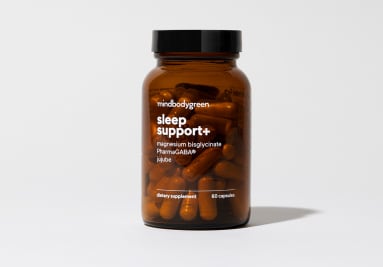Can't Turn Your Brain Off At Night? This Underrated Ingredient Ushers In Calm
Hint: It's produced using a fermentation process.


Image by ALEXEY KUZMA / Stocksy
May 5, 2023
The human brain, unfortunately, doesn't come with an on-off switch. Getting into sleep mode after a long day is a gradual process that involves physiological changes (slower heart rate, reduced temperature and blood pressure) as well as shifts in sleep-regulating neurotransmitters—gamma-aminobutyric acid (GABA for short) being one of the biggies.
This chemical messenger's job is to tell the body to relax and calm down following any outside triggers or excitement. Needless to say, when levels of it are off, our sleep tends to suffer.
Advertisement
This ad is displayed using third party content and we do not control its accessibility features.
The research on PharmaGABA® for sleep
Low GABA levels—which can be caused by genetics, certain medication, poor diet, and just everyday stressors—have been associated with long-term sleep issues1 and difficulty falling asleep. While eating a healthy diet, exercising, and doing calming activities like meditation can help bring levels back into balance, there's also a premium ingredient that's been shown to support healthy GABA levels and help people fall asleep fast.*
Meet PharmaGABA®, a version of the GABA neurotransmitter that's manufactured using a fermentation process that isn't too dissimilar from the one used to make cheese, wine, and other fermented foods.
Acclaimed integrative medicine doctor Robert Rountree, M.D., has been using the bioactive GABA to help clients sleep for decades, to great success.*
"It's an amazing substance," Rountree previously told mindbodygreen's co-CEO Jason Wachob. "It's been shown to bind to the same GABA aminobutyric acid receptors in the brain that help us calm down and relax."*
Rountree explained that some of his medical colleagues were at first doubtful that manufactured GABA could have the same effects as the real deal, but recent research has shown otherwise. In one 2018 double-blind, placebo-controlled trial on 40 patients who reported difficulty falling asleep, a four-week GABA regimen2 was shown to decrease their sleep latency (the time it takes someone to fall asleep) and increase sleep efficacy (the percentage of time in bed someone actually spends sleeping).*
"I wouldn't say that it knocks you out," Rountree clarifies. "It just makes you feel calmer and more relaxed, and there are studies showing that it actually affects brainwaves."*
In one of those clinical trials, EEG measurements found that GABA, compared to water and L-theanine (another amino acid that's thought to promote sleep), significantly increased the brain's alpha waves3 (relaxing) and decreased its beta waves (stimulating) within an hour of administration.* In short, Rountree says? "It's the real deal."
Advertisement
This ad is displayed using third party content and we do not control its accessibility features.
Sleep aids that pair well with PharmaGABA®
When mbg formulated its first sleep supplement, sleep support+, we knew PharmaGABA® had to be part of the formula.
To boost its relaxation chops, we paired PharmaGABA® with a bioavailable form of magnesium, magnesium bisglycinate.* The mineral actually binds to the same receptors in the brain that GABA does, setting off a similarly calming reaction throughout the body.* The formula is topped off with jujube, a fruit that's long been prized in traditional Chinese medicine for its ability to improve sleep quality4 and enhance daytime functioning.*
"[Magnesium and PharmaGABA®] can enhance the ability to fall asleep, but they also improve sleep quality, and so does jujube,"* Rountree said at the summit. "This is kind of an ideal formula for both."
Advertisement
This ad is displayed using third party content and we do not control its accessibility features.
The takeaway
Unlike other popular supplements like melatonin, sleep support+ doesn't just help people fall asleep faster. It's designed to improve all-around sleep quality, too, leading to a difference that you can feel the next morning.* While it's not quite an on-off switch for the brain, it might just be the next best thing.
If you are pregnant, breastfeeding, or taking medications, consult with your doctor before starting a supplement routine. It is always optimal to consult with a health care provider when considering what supplements are right for you.
Advertisement
This ad is displayed using third party content and we do not control its accessibility features.

 Tfoso
Tfoso 


































